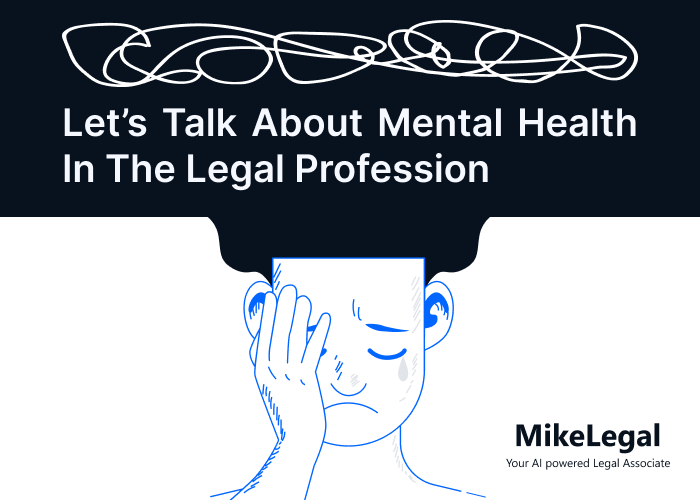The Mental Health Crisis in the Legal Profession: How AI and Automation Can Help
The legal profession has long been associated with high levels of stress, burnout, and poor mental health among its practitioners. Lawyers often face demanding workloads, intense deadlines, and high-stakes cases, which can take a significant toll on their well-being. Sadly, studies have shown that lawyers experience mental health issues, such as depression and anxiety, at a much higher rate than the general population. (Yoon, 2016)
The Alarming Statistics of Mental Health in Law
It’s a startling fact that 1 in 3 lawyers struggle with mental health issues. The rigors of the legal profession contribute to a higher incidence of anxiety, depression, and burnout compared to other professions. Understanding these statistics is the first step towards recognizing the scale of the problem and the urgent need for solutions.
Common Stressors in the Legal Profession
Legal professionals are no strangers to stress. Some of the most common stressors include:
- High Workloads: The sheer volume of cases and documentation can be overwhelming.
- Tight Deadlines: The constant race against time to meet court dates and client demands adds to the pressure.
- Demanding Clients: Managing client expectations and delivering results can be a significant source of stress.
One of the primary drivers of this mental health crisis is the nature of the work itself. Lawyers are required to handle complex legal issues, engage in high-stakes negotiations, and navigate a constantly changing regulatory landscape, all while managing the expectations of clients and colleagues. (Armour & Sako, 2020) The pressure to bill high hours, meet tight deadlines, and maintain a competitive edge can be overwhelming, leading to chronic stress and burnout.
Numerous changes in healthcare technologies, accountability frameworks, and payment models have also contributed to increased work demands and occupational stress for healthcare professionals, including lawyers. The growing emphasis on efficiency, productivity, and performance metrics has put additional strain on legal professionals, who are often required to do more with less.
Fortunately, emerging technologies such as artificial intelligence and automation offer promising solutions to address the mental health crisis in the legal profession. AI-powered tools can help to automate repetitive, time-consuming tasks, such as legal research, document review, and contract drafting, freeing up lawyers to focus on more complex, high-value work (Davis, 2020) (Kauffman & Soares, 2020).
How AI and Automation Can Help Legal Professionals
The integration of AI and automation in the legal field is revolutionizing how lawyers work, providing significant mental health benefits. Here’s how:
- Reducing Workload: AI tools can handle routine tasks such as document review, legal research, and contract analysis, freeing up lawyers to focus on more meaningful work.
- Improving Efficiency: Automation speeds up time-consuming processes, allowing lawyers to meet deadlines more easily and reduce stress.
- Enhancing Accuracy: AI-powered tools minimize errors in routine tasks, reducing the stress associated with meticulous legal work.
Building Support Systems in Law Firms
Creating a supportive work environment is crucial for managing mental health. Law firms can foster this by:
- Conducting Regular Awareness Sessions: These sessions educate employees on the importance of mental health and provide strategies for managing stress.
- Providing Access to Mental Health Resources: Offering resources such as counseling services and stress management workshops.
- Encouraging Open Communication: Promoting a culture where employees feel comfortable discussing their mental health challenges without stigma.
Moreover, AI-driven predictive analytics can help lawyers anticipate and manage potential risks, reducing the stress and uncertainty associated with legal work. By leveraging these technologies, lawyers can streamline their workflows, reduce their workloads, and devote more time to self-care and professional development, ultimately improving their mental health and well-being.
To know more about MikeLegal, click here 👉🏽 https://mikelegal.com/
Contract automations – https://mikelegal.com/ContractSolutions
IP portfolio automation solutions – https://mikelegal.com/IPSolutions
Litigation Management – https://mikelegal.com/Litigator
Document Analysis bot – https://mikelegal.com/DocChat
References:
- Yoon, A. (2016, October 1). The post-modern lawyer: Technology and the democratization of legal representation. University of Toronto Press, 66(4), 456-471. https://doi.org/10.3138/utlj.4007
- Armour, J., & Sako, M. (2020, January 16). AI-enabled business models in legal services: from traditional law firms to next-generation law companies?. Oxford University Press, 7(1), 27-46. https://doi.org/10.1093/jpo/joaa001
- Davis, A E. (2020, January 1). The Future of Law Firms (and Lawyers) in the Age of Artificial Intelligence. Fundação Getúlio Vargas, Escola de Direito, 16(1). https://doi.org/10.1590/2317-6172201945
- Kauffman, M E., & Soares, M N. (2020, October 18). AI in legal services: new trends in AI-enabled legal services. Springer Science+Business Media, 14(4), 223-226. https://doi.org/10.1007/s11761-020-00305-x





